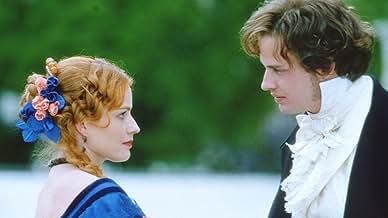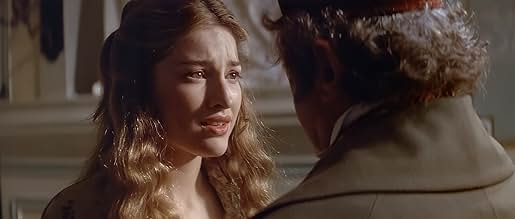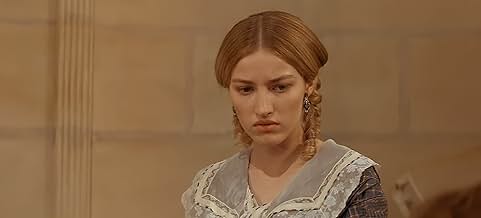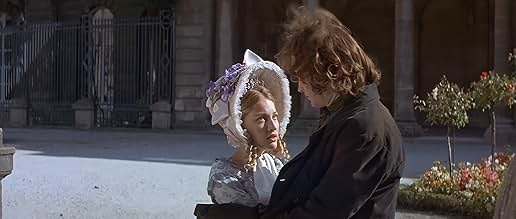Adicionar um enredo no seu idiomaWhen her sister dies in 1846, Bette moves from the château to Paris to work as a theater seamstress. She helps a handsome, starving artist. When her niece lures him away from her, she plans ... Ler tudoWhen her sister dies in 1846, Bette moves from the château to Paris to work as a theater seamstress. She helps a handsome, starving artist. When her niece lures him away from her, she plans a devious revenge.When her sister dies in 1846, Bette moves from the château to Paris to work as a theater seamstress. She helps a handsome, starving artist. When her niece lures him away from her, she plans a devious revenge.
- Direção
- Roteiristas
- Artistas
- Prêmios
- 1 vitória e 1 indicação no total
- Direção
- Roteiristas
- Elenco e equipe completos
- Produção, bilheteria e muito mais no IMDbPro
Avaliações em destaque
This fascinating tale is about a relative who is treated poorly by everyone in her aristocratic family, while they themselves live in debt, denial, and high fashion. Jessica Lange plays the title character with a cynical smirk, as though she's daring every one to call her out, yet she knows – only too well - that people are so consumed by their own personal dramas that they ignore the fine details.
Described as "the bad seed who refused to blossom", Bette is the sister of Adeline, who languidly takes her time dying, while instructing her spinster sibling as to what flowers to lay on her casket. One look at the two – Adeline in her death-bed finery and Bette, in a basic drab dress, devoid of any adornment – and it's all too evident where the balance of power resides.
Bette: (to Jenny) "How could you know? You don't know who I was sacrificed to – to Adeline. They slapped me and caressed her. I went dressed like a wretch and she like a fine lady. Adeline, the garden, peel the vegetables, Bette. She never lifted a finger except to tie her ribbons."
Describing herself as a "country peasant", Bette lives in the slums of Paris, working as a costume seamstress to the reigning burlesque star of the day, Jenny Cadine (played by Elizabeth Shue), who vainly shows off her derrière before every final curtain is rung down. Jenny puts off the ticking clock of time by enjoying the attentions of her many rich – and generous - admirers, yet one fateful day encounters her worst nightmare.
Jenny: "I'm 24 I may as well be dead."
Bette: "You were 24 years old yesterday and it didn't seem to bother you then."
Jenny: "Today, while I was walking in the park, I came across a hideous old woman, face swollen and scratched; she stank of stale wine and sweat. In her filthy tresses she had placed a beauty patch, one red camellia I knew at once who she was - she was known as Carabine, the most famous courtesan in Paris. Everyone envied her dazzling shoulders, her milky skin. She had a neck so smooth it might have been turned on a lathe. Her trademark was a red beauty patch, a red camellia."
'Carabine? Is that you?', I asked.
'No, there is no Carabine, she has left me.'
Originally a novel by French author, Honore de Balzac, this modern version boasts an international cast of talent. Bob Hoskins (Cesar Crevel), Hugh Laurie (Baron Hector Hulot), Aden Young (Wenceslas), Kelly Macdonald (Hortense Hulot), and Geraldine Chaplin (Adeline Hulot) all twist and turn in time to Bette's song of vengeance. Set in Paris, during the pre-revolutionary period of 1846, screenwriters Seifert and Tarr turn Balzac's morality tale into a microcosm of the class resentments barely simmering just beneath the pearls and petticoats of Bette's shadow world. Yet she's nothing if not flexible, as she revises her best-laid plans in the face of cross and double-cross by family and high society associates alike.
Bette: "I'll see them – all of them – in the dust! We're both daughters of the soil, and blood of the voge, and do you trust me, as a sister?"
Jenny: "Yes "
Bette: "And will you help me, as you would a sister?"
Jenny: "Yes "
Bette: "Then you will be the ax and I'll be the hand that wields it."
Surrounded by people with their own notions of power, Bette plays nonstop Powernoply until she wins all, while the French Revolution rages. She's able to play upon the passions of her tormentors and deftly manages to wreck her subtle brand of ruthless revenge upon one and all, causing adultery, a duel, physical illness, embezzlement, financial ruin, imprisonment in the Bastille, and a crime of passion - all of which sees her contentedly sewing in the grand house, dressed in her own silken finery, cooing to a child who's the product of this genteel carnage.
Bette (Jessica Lange) has always lived in the shadow of her more beautiful sister, Adeline. Adeline was always prepared for marriage and society, while Bette became a virtual servant for her family. To make matters worse, Adeline marries the one man Bette loves, the Baron Hulot. The film opens with Adeline on her death bed, listening to the confessions of her adulterous husband and spendthrift son. She makes Bette promise to take care of her family. The malicious grin on Bette's face lets us know what is coming. Bette orchestrates her revenge on each member of the family, with a cunning her family never suspected.
Part of what makes this film so delicious is that none of the characters are really very likeable, but they are all very interesting and well drawn. Even Bette is not someone you would want to welcome into your own family (although she'd make a fascinating guest at a dinner party). The only character who fares even mildly well is Cesar Crevel (Bob Hoskins). A merchant who has become the wealthiest man in Paris, he is attempting to buy his way to respectability. He is at least without pretense, even going so far as to offer 200,000 francs to see Hortense Hulot (the Baron's daughter, played by Kelly MacDonald) naked.
The story follows Bette's attempts to destroy the Baron and his family by manipulating them in their love affairs. The marriage of Hortense is expected to save the family financially, hence the appearance of Crevel. But Hortense loves the penniless Count Wenceslas Steinbach (Aden Young), a sculptor. Meanwhile the Baron has been borrowing from everyone in Paris to keep his mistress, Jenny Cadine. Bette controls all of the characters like a Grand Master.
The backdrop to the film is the decay of the French aristocratic society. Resting on the laurels of the Empire of Napoleon, oblivious to the coming revolution (the film begins in 1846), and in complete denial of the changes around them, we actually cheer for Bette as she systematically destroys the Hulot family. In a way it's the revolution carried out from within, making the fall all the more sweet.
This film is really exceptional. My only criticisms would be that (1) Elisabeth Shue as the famous actress/courtesan Jenny Cadine is merely adequate, (2) it is almost impossible to imagine the stunning Jessica Lange as the "plain" sister, and (3) the characters' accents tend to vary from time to time. The script is intelligent, clever, and realistic. The acting is very strong all around, especially by Lange. Hoskins is terrific, hitting just the right note of a materialistic man trying to be a nobleman, but not quite getting it. The locations and sets are lush and as decadent as one would expect. The direction of Des McAnuff is crisp and assured, the pace even and well controlled.
Você sabia?
- CuriosidadesAccording to his diaries, Alan Rickman turned down a role in this film.
- Citações
Mlle. Elisabeth 'Bette' Fisher: For the sake of their pleasure, men commit the most appalling crimes.
- Trilhas sonorasThe Other Side of Heaven
Performed by Elisabeth Shue
Music and Lyrics by Danny Troob and Des McAnuff
Adapted from the music of Jacques Offenbach
Produced by Simon Boswell
Principais escolhas
- How long is Cousin Bette?Fornecido pela Alexa
Detalhes
- Data de lançamento
- Países de origem
- Central de atendimento oficial
- Idioma
- Também conhecido como
- Cousin Bette
- Locações de filme
- Empresa de produção
- Consulte mais créditos da empresa na IMDbPro
Bilheteria
- Faturamento bruto nos EUA e Canadá
- US$ 1.295.194
- Fim de semana de estreia nos EUA e Canadá
- US$ 76.488
- 14 de jun. de 1998
- Faturamento bruto mundial
- US$ 1.295.194
Contribua para esta página



































